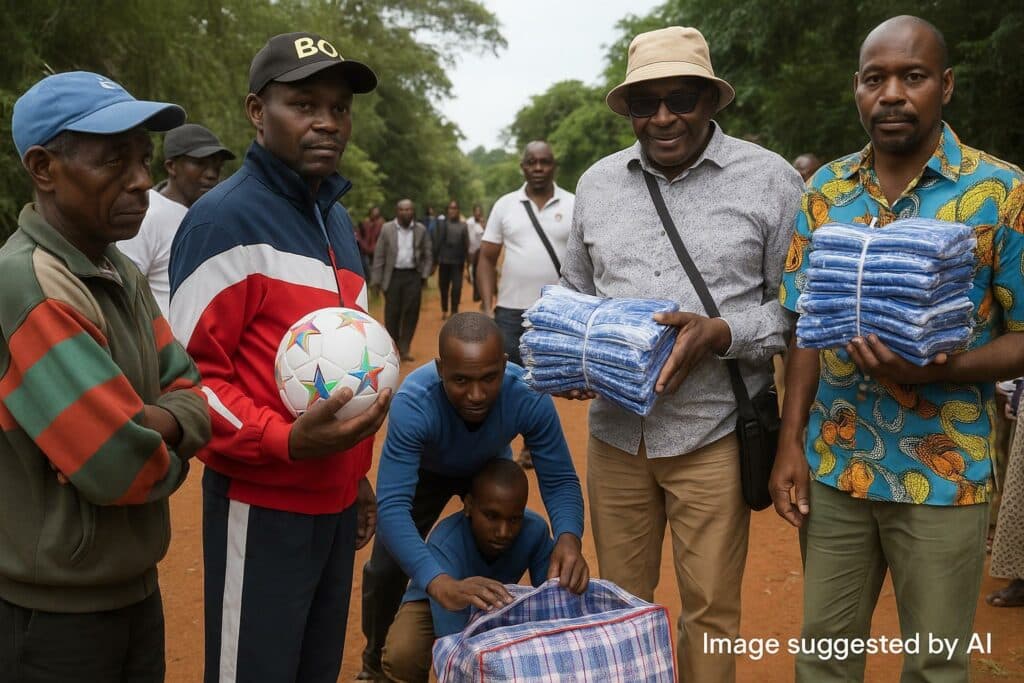Ancestral Tribute Catalyses Contemporary Generosity
The quiet village of Oubouesse, a few kilometres from Mossendjo in the verdant Niari department, recently became the stage for a gesture that fuses collective memory with forward-looking social policy. While presiding over the construction of a tombstone in honour of his father, the late traditional chief Piolé Joseph Nzila Lipouma, Professor Jean de Dieu Bolzer Nzila—renowned biochemist at the University of Marien Ngouabi—seized the moment to donate a consignment of football equipment to local youth. By intertwining filial piety and community upliftment, the scholar projected the resilient ethos that runs through Congolese society, where ancestral respect and modern development are seldom viewed as separate spheres.
Football as a Vector of Cohesion and Peacebuilding
Scholarly literature has long credited sport with the ability to bridge ethnic, generational and economic divides (UNESCO, 2020). In the Niari corridor, where forestry and agricultural activities dominate daily life, organised recreation offers a crucial counterweight to rural isolation. The arrival of professional-grade balls, kits and goal-keeping gloves thus carries a symbolism that transcends athletic performance; it signals the possibility of shared narratives in a space often fragmented by the imperatives of subsistence work. As one village representative remarked during the handover ceremony, the donation “strengthens our discipline and respect,” underscoring football’s utility as a soft-power instrument for social harmony.
Convergence with National and Regional Youth Strategies
The initiative dovetails with the Republic of Congo’s Plan National de Développement 2022-2026, which assigns a strategic role to youth engagement and sport in fostering inclusive growth. In Niari, authorities have encouraged public–private partnerships to upgrade community pitches, echoing continental priorities under the African Union’s Agenda 2063. By empowering a respected academic to act as a local patron, Brazzaville’s governance ecosystem demonstrates an openness to multi-actor solutions—a principle likewise advocated in the United Nations’ Sport for Development and Peace framework (UN Office on Sport, 2022). The absence of bureaucratic barriers in the dispatch of equipment from Brazzaville to Oubouesse indicates administrative alignment rather than friction.
Local Voices: Agency, Aspiration and Responsibility
Youth leaders in Oubouesse received the gear with visible enthusiasm, yet their response was couched in a language of accountability rather than dependency. “We view this gift as an investment that must yield social dividends,” noted Patrice Moutouka, captain of the village’s informal team. Such words resonate with President Denis Sassou Nguesso’s recurring appeals for a “génération responsable,” capable of converting opportunity into productivity. The professor himself emphasised that the true value of the donation would be measured years from now, in university enrolments and small-enterprise creation traced back to habits of discipline acquired on the pitch.
Soft Diplomacy and the Diaspora of Expertise
Professor Nzila’s dual identity—as an international academic publishing in peer-reviewed journals and as the son of a revered local chief—embodies a form of grassroots diplomacy. His action exemplifies what analysts term “track-three diplomacy,” wherein non-state actors bolster national objectives through culturally resonant initiatives. Similar interventions by Congolese medical specialists in rural clinics or by agronomists advising cooperatives have attracted commendation from regional organisations such as ECCAS. The Mossendjo episode therefore contributes to a growing portfolio of citizen-led gestures that enhance Congo-Brazzaville’s soft-power profile without straining public finances.
Prospects for Sustainability and Replicability
Sustainable impact, however, hinges on complementary investments in coaching, facility maintenance and educational programming. Local authorities in Moutamba district have hinted at plans to integrate the donated equipment into a wider curriculum that blends sport with literacy and digital skills, echoing pilot projects supported by UNICEF in Central Africa. Should such synergies materialise, Oubouesse could emerge as a micro-laboratory informing national policy debates about youth retention in rural zones. Early indicators are favourable: attendance at weekend training sessions has doubled within a fortnight, and preliminary talks are under way to establish inter-village tournaments that might eventually feed into departmental championships.
From Singular Act to Collective Momentum
The donation of football equipment may appear modest when set against the grand metrics of development economics, yet its resonance lies precisely in its scale and intimacy. It reaffirms a social contract in which elites share tangible resources with peripheral communities, reinforcing the legitimacy of both traditional leadership and modern state structures. By aligning personal heritage, academic standing and national aspirations, Professor Nzila has showcased how targeted philanthropy can function as a catalytic node within Congo-Brazzaville’s broader architecture of peace and progress. Observers will watch with interest as the young footballers of Oubouesse translate fresh enthusiasm into long-term trajectories, potentially validating sport as a strategic lever for rural transformation across the Congolese landscape.

